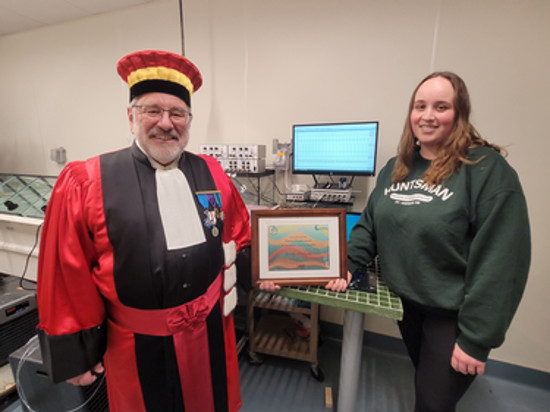SGS Celebrates Emily Williams - Recipient of the 2024 Thierry Chopin Award for Graduate Coastal Studies
Author: Sarah Hall
Posted on Apr 22, 2024
Category: Student Stories , News and Events , Money Matters

Congratulations to Emily Williams who was recently announced as the recipient of the 2024 Thierry Chopin Award for Graduate Coastal Studies.
Emily is co-supervised by Dr. Ben Speers-Roesch and Dr. James Kieffer of the Department of Biological Sciences at the University of New Brunswick Saint John Campus (UNBSJ). Her project asks how do Arctic fishes (Arctic char, Greenland cod, and lake char) react to temperature changes, acclimate to seasonal variations, and to what extent are any changes driven by changes in cardiac regulation by adrenaline. Arctic fishes contribute to the subsistence of northern communities and serve important ecological roles in the North.
To explore this, Emily catches Arctic fishes at the end of winter and summer. They are anaesthetized and fitted with subdermal electrodes to measure heart rate and other cardiac endpoints. Heart rate measurements provide a good estimate of whole organism performance under environmental/thermal stresses. Emily is able to determine critical temperature thresholds of cardiac function in these wild Arctic fishes.
Emily’s northern research will improve our understanding about the ability of Arctic fishes to regulate and maintain their heart function and their cardiac heat tolerance (and thus whole animal performance) with changes in temperature.
The Canadian Arctic is warming at 3 times the average global rate, resulting in rapid temperature changes and environmental variations, such as changes in the timing of first ice and breakup. Some fishes have the capacity to acclimate to these thermal changes, but limits likely exist. If Arctic species are unable to cope with more variable and warming conditions, their future success, including completing their annual migrations, may be at risk.
Emily hopes that her new information can be used by researchers and fisheries managers to identify potential conservation policies for specific populations, including altering the harvest season based on the vulnerability of the populations, or in response to extreme heat events.
Arctic char is of immense importance culturally and to food security and the economy of many Canadian Arctic communities; exports from Nunavut in 2015 were worth $1.8 million and commercial fisheries provide year-round employment. Therefore, management of these coastal regions and the fish populations they support is paramount for residents.
Congratulations again, Emily!
